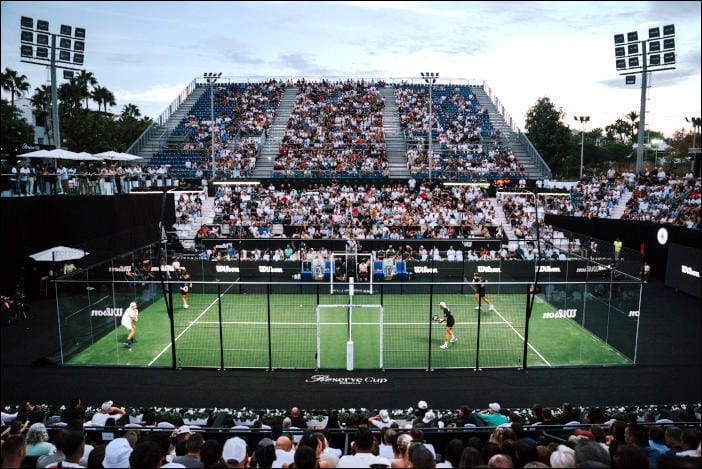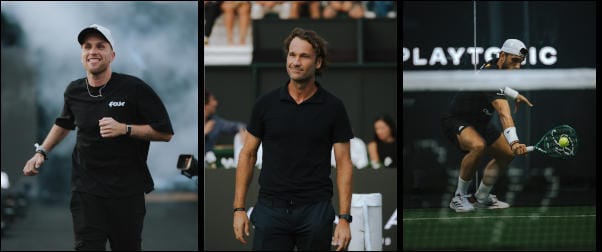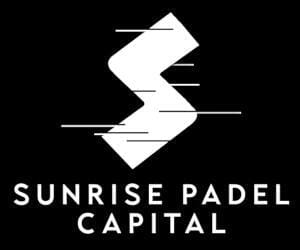- Racket Business
- Posts
- Padel Power Sweeping the World 10/25
Padel Power Sweeping the World 10/25
RSPA - Cage91 - Reserve Cup - Sunrise Padel Capital - More...

Table of Contents
RSPA Padel Certification
Next up - Salt Lake City, Utah

Ready for SALT LAKE CITY in October???
Hello Padel lovers,
“I am not waiting for BIG THINGS to happen. I am the one creating the BIG MOMENTS to celebrate”.
”If the courts are the engine of the sport, the COACHES ARE THE FUEL of the industry”. Our great Marcos is always inspiring.
Padel is booming, and over 1,000 coaches have been certified already in the USA.
Don’t let anyone else take the position that you can own for the future!
Join us in Utah, Florida, and California in the next months! See below:
Oct 11-12 (Sat/Sun): Woods Cross, Utah at SLC Padel Club
NOV 15-16 (Sat/Sun) WEST PALM BEACH, Florida at XCEL PADEL
Nov 29-30 (Sat/Sun) Sherman Oaks, California at Pura Padel Los Angeles
Cage91 Co.

Powered by Taktika Equity
UK
IRELAND
Reserve Cup Expands Globally: Marbella Becomes First International Stop
As padel continues to surge as one of the world’s fastest-growing sports, the Reserve Cup made its international debut in Marbella (Sept. 18–20, 2025), transforming the legendary Puente Romano Hotel into a world-class stage for competition, culture, and luxury.

Marbella Stadium Court
Led by Reserve Padel Founder Wayne Boich and Honorary Chairman Jimmy Butler, the event marked the first-ever global stop of the Reserve Cup Series, showcasing how padel’s growth is now attracting elite athletes, celebrities, and global audiences alike.
Highlights include:
Team Reserve, captained by Jimmy Butler, secured the first Reserve Cup Marbella title against Team Marbella, led by Spanish football icon Joaquín Sánchez.
A high-stakes lineup of world-class padel players, with $500,000 USD in prize money on the line.
Celebrity attendees, from Carlos Moyá (tennis legend) and Fernando Llorente (soccer star) to top Spanish entertainers.
Over 10,000 guests enjoying VIP hospitality experiences, exclusive brand activations, and live global streaming via Red Bull TV.

From left: Nicky Romero, Carlos Moya, Ale Galán
With Miami and Marbella stops now complete, the Reserve Cup has cemented itself as a premier global lifestyle and sport event, blending competition, entertainment, and star power.
You can find the full press release HERE
Sunrise Padel Capital: Building the Future of Padel in North America

In just over a year since its founding, Sunrise Padel Capital has emerged as the leading investment platform driving the growth of padel across North America. With nine clubs already funded through its first fund, Sunrise has built the largest portfolio of padel club investments in the United States — and it’s just getting started.
From Vision to Market Leader
Sunrise Padel Capital’s story began years before its official launch, when the founding partners started making angel investments in the padel industry — backing early clubs and technology platforms that were helping introduce the sport to North America. In 2024, the firm formalized that vision with a $2.5M proof-of-concept fund. The mission was clear: accelerate padel’s growth by partnering with exceptional operators, providing both capital and strategic guidance, and raising the standard for club operations. Their first fund was fully deployed into nine clubs across key U.S. markets, giving Sunrise unmatched experience and data on what makes padel clubs succeed.
The Opportunity in the U.S.
Globally, padel has over 30 million players and more than 63,000 courts, with Europe and South America leading the way. Spain alone boasts over 16,000 courts — compared to as of the end of last year just 400 in the entire United States. This gap represents a multibillion-dollar opportunity, and Sunrise Padel Capital sees the U.S. as being roughly a decade behind Spain’s development curve. With growth rates exceeding 80% annually in recent years, the sport is poised for explosive expansion.
Unlike in Europe, American padel clubs are being designed with larger footprints, best-in-class hospitality, and technology integration to match U.S. consumer expectations. For Sunrise, this means not just importing a sport, but reimagining how it’s delivered.
Fund II: Expanding the Platform
After the success of Fund I, Sunrise launched Fund II with a $25M target to double down on an integrated approach:
Club Development – Building and backing world-class venues in key U.S. and Canada markets.
Innovation – Investing in tools like AI-driven video, booking platforms, and performance analytics.
“We are approaching a pivotal moment with the anticipated first closing of our second fund, which will further reinforce Sunrise Padel Capital’s position as a leader in the growth of padel across the United States,” stated Diego Campos, Managing Partner, Sunrise Padel Capital. “This new capital will empower us to continue driving strategic club development, advance technological innovation, and support the professionalization of the sport. We remain committed to building a robust padel ecosystem and look forward to partnering with top-tier operators and stakeholders to unlock the full potential of padel nationwide.”
The goal isn’t just to build courts — it’s to build the sport’s foundation.
This dual focus on physical infrastructure and ecosystem innovation positions Sunrise not just as a fund, but as a vertically integrated platform for the sport’s growth.
What Sets Sunrise Apart
Unlike generalist private equity or venture funds, Sunrise Padel Capital’s strategy is laser-focused on padel. The team combines deep operational expertise, a global network in the sport, and a disciplined investment process that identifies promising operators and technologies early. Three of the firm’s General Partners are former Division I tennis players, bringing a lifetime of high-performance sports experience to their investment and operational decisions. Post-investment, Sunrise actively works alongside management teams — from advising on pricing and marketing to leveraging its vendor relationships for cost savings and accelerated timelines.
The team also leans on a network of advisors with expertise in brand building, finance, real estate, technology, and hospitality — ensuring that each club doesn’t just open, but thrives.
The firm’s ecosystem approach also creates synergy between portfolio companies. For example, a club operator can benefit from preferred court pricing and installation rates, integrated tech solutions, and access to national league structures — all through Sunrise’s partnerships..
Looking Ahead
The next few years are set to define padel’s future in North America. Fund II is set for its first closing in September, bringing fresh capital to scale both club development and ecosystem investments. Early targets include Austin, Denver, and Seattle — markets primed for padel adoption.
The long-term vision is clear: a national network of high-quality clubs, powered by modern technology, thriving communities, and a professional structure that cements padel as a major U.S. sport.
“This is a once-in-a-generation opportunity,” said Campos. “We’re not just chasing growth — we’re shaping it.”
And as padel’s popularity explodes across the country, Sunrise Padel Capital plans to be right in the middle of the action — serving up the future of the sport, one court at a time.
The Most Consistent Padel Scene in the U.S. Has No Name
The Most Consistent Padel Scene in the U.S. Has No Name
Guest Column by Will Persson
If you’ve played advanced-level padel in most U.S. cities, you’ve probably run into the same issue: you want a real match, but organizing one is a mess. Group chats fall apart. Players drop out. The levels are mismatched. You end up spending more time coordinating than competing.
But in Miami, there’s a scene that quietly solves this – at least for a specific type of player.
Several nights a week, a rotating group of advanced, non-pro players show up to compete in fast, competitive mini-tournaments. These aren’t part of a broader league or official system. Usually, it starts with a WhatsApp message, followed by a name on a list, an appropriate fee relative to court time, and a few hours of one-set matches against strong competition.
Most of these tournaments are intentionally low-key, run without heavy branding, marketing, or a governing body – yet still organized well enough to deliver high-quality matches every time. You can’t even find a schedule with all of them listed online. But it might be the most consistent, competitive circuit in the country for serious amateur padel players. And it works because it’s not trying to be more than that.
The Unofficial Weekly Tour
I’m calling it a tour, though that’s a stretch. There’s no official schedule, no organizer, and nothing connecting these events except the players who keep showing up. A lot of the regular players have the schedule memorized, and this summer it’s been looking like:
Thursday nights at Reserve Design District
Friday nights at I-95
Sunday nights at Ultra, Sunset, and Reserve Sole Mia
Tuesday nights at Ultra again
Of course, there are other mini tournaments going on at other clubs, but these tournaments in particular seem to get the highest concentration of advanced players.
Each club has its own format and personality, but many of the same players move through the entire tour. The players are competitive, looking for structured, high-quality matches, without the hassle of organizing games or the multi-day commitment of a full tournament.
Each spot has its own vibe – some a little more polished, some more local – but none of that gets in the way. Signups are simple, the formats run clean, and the focus stays on playing. You show up, compete, and get real games without the usual back-and-forth.
Why It Works
It’s organic and player-driven: No one designed the broader mini-tournament ecosystem. It just came together because the conditions were right and a critical mass of motivated players kept showing up.
It simplifies high-level matchmaking: Skill isn’t the only barrier – coordinating between four players is a massive headache. On top of that, Playtomic, Playbypoint, and World Padel all use different rating systems, so the limited official match data we do have gets diluted across three platforms. It’s hard to get a true read on level from those numbers alone. These events bypass that ambiguity by running through WhatsApp groups where most players already know each other’s level.
It creates shared momentum across clubs: Many of these players aren’t loyal to clubs; they’re loyal to the level. Most clubs, understandably, would love to lock in their audience. But at the more advanced levels, it’s very rare any single club has enough consistent depth on its own. So the group moves. Not because of brand, but because that’s where the best games are.
The prizes help, especially early on: While most players show up for the competition, the prizes still play a role. Winners usually walk away with club credit, some gear, or cash. It’s not always what keeps people coming back, but early on, it’s a good way to get new players in the door.
It builds an actual community: When the same group competes multiple nights a week, friends are made and rivalries form. You’re more excited to play the team that edged you out last week than a random pairing you’ve never met.
What This Scene Teaches About Building Real Community
This works because there’s a group of serious players who show up often, know each other’s games, and want structure without a ton of overhead. It didn’t come from a league or a strategy deck. It came from repetition, minimal friction, and word of mouth.
It’s a reminder that the strongest communities don’t always live inside one club or one system. Sometimes they grow between the cracks – players moving wherever the level is right, bringing the energy with them.
Could this same format work for different levels? Probably. You don’t need 30 high-level athletes. You need a handful of players who want more reps and fewer headaches. People don’t always need state-of-the-art facilities; sometimes, they just need an easy path to good games with people they like.
Written by Will Persson
Mostly in tech. Often on court. Views are based on my own experience in racket sports. [email protected]
NOTEWORTHY
Sports Business Journal
Epic Padel raises $10M seed round to expand clubs in the U.S.
Virginia-based padel club operator Epic Padel has raised an oversubscribed $10M seed funding round led by NowaisWorld and Stryde Ventures as it aims to expand its presence in the U.S. The round also included participation by 305 Ventures, High Water Venture Partners, Lane Holdings, Off Court Ventures, Silverback Capital Group, and a handful of angels and athletes.
Founded in 2023, Epic Padel currently has one club open -- in Charlotte -- and says the additional capital will facilitate launching four to six more. Possible locations include Virginia, Wisconsin (specifically, Milwaukee), South Carolina, and Utah, with a focus on underutilized spaces like racket clubs, parking lots, and warehouses.
Read the full article